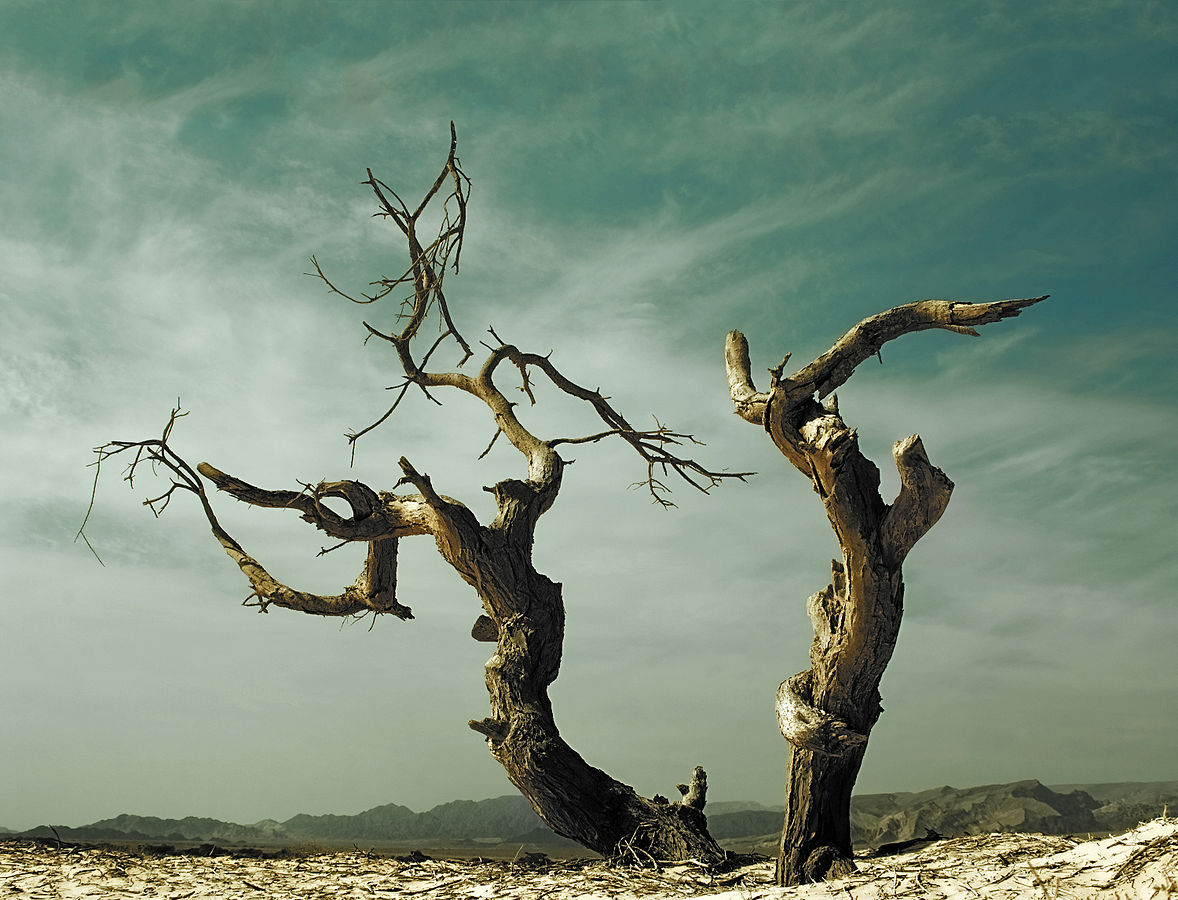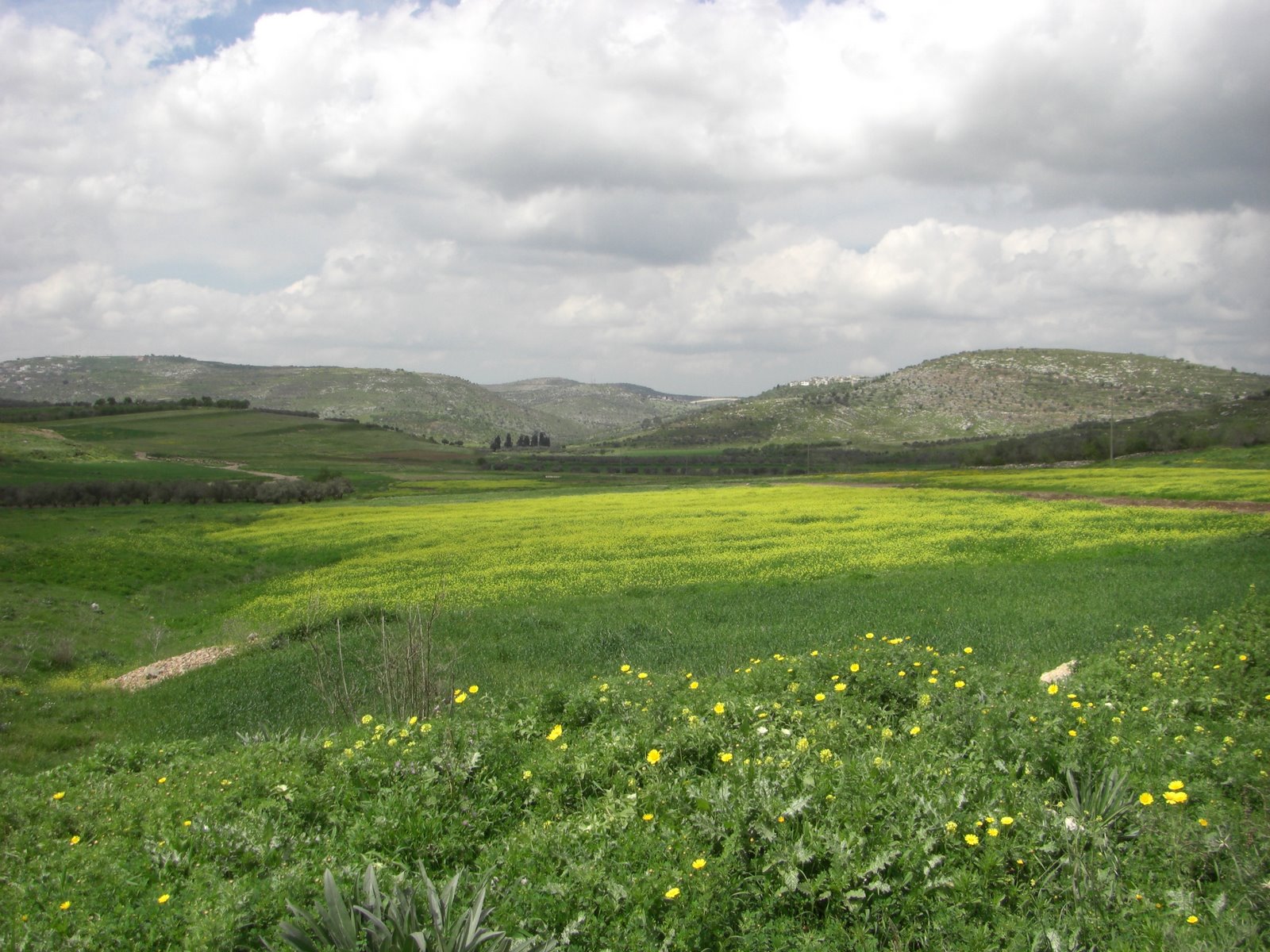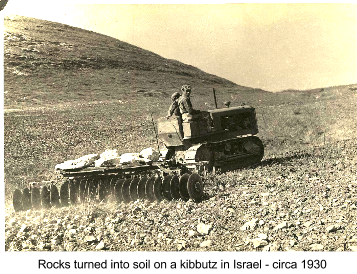Israel Reborn: Once Again The Land of Milk and Honey

“There was hardly a tree or a shrub anywhere. Even the olive and the cactus, those fast friends of a worthless soil, had almost deserted the country.” These are the words of America’s celebrated author, Mark Twain, as he described his personal observations of Palestine in the mid 1860’s. A “blistering, naked, treeless land.”, he called it. His book titled The Innocents Abroad was published in 1869 and offers other observations. “No landscape exists that is more tiresome to the eye than that which bounds the approaches to Jerusalem.”

Jesus and the prophets prophesied of many signs that would precede his return. These were given to His Church to stir up faith for that imminent return. Beginning with the destruction of the Temple by Titus less than 40 years after Jesus’ ascension and on down through the ages to this very day, Christians who have watched for these signs take note of them. Seeing the people of Israel taking root; The blossoming and budding of the land to fill the face of the earth with fruit; These should greatly comfort us and bolster our faith that the Word of God is true. Prophecy is a valid light to our feet.
Jesus will return as promised and those who live for and look for His coming, whether they be “asleep” or in this flesh, at the time when He will appear, will be caught up with Him. We of the EOE keep an eye out for these signs on a continual basis and as good watchmen announce their appearances.
God had spoken to the Jews after freeing them from Egyptian bondage “if you walk contrary unto me, and will not hearken unto me” he said, then “I will bring the land into desolation: and your enemies which dwell therein shall be astonished at it. And I will scatter you among the heathen, and will draw out a sword after you: and your land shall be desolate, and your cities waste.” Leviticus 26:32-33 What Mr. Twain and other travelers of his day had witnessed was a complete fulfillment of Prophecy.
Israel once thrived as a vibrant and bountiful nation. Set along the eastern shores of the Mediterranean Sea, it is centered as a mere sliver of the Fertile Crescent. At the time Jesus walked its paths Israel was farming grains such as wheat, barley and corn for making bread. Fruits, including melons, figs, dates, grapes, and olives were produced. The land had been sustaining man for thousands of years, it was a land “flowing with milk and honey”, abundant in corn, wine, oil; fields and groves sustaining cattle herds and flocks of sheep. But God would not be mocked according to his promises made to his people.
To the Jews, he promised abundant blessing or curse relevant to their obedience to him. What was clearly told to them and recorded in Leviticus did come to pass; God’s word is always true, and let all Gentiles remember these things happened to them for our examples: They happened and are recorded for our admonition, upon whom the ends of the world are come.
God set in motion a Jewish dispersion shortly after the resurrection of Jesus Christ, one that would last nearly 2000 years. For the next two millennia, the region of Israel crumbled under great contention, controlled by many people including Romans, Byzantines, the Sunni Arab Caliphates, the Shia Fatimid Caliphate, Crusaders, Ayyubids, Mameluks, Ottomans and the British. As a result, the fertile land deteriorated greatly over the centuries, especially at the hands of men due to their neglect and careless abuse.
The Land Pays When It Is In the Wrong Hands?
Roman occupation and oppression provoked the Jews to rebel and Titus eventually sacked Jerusalem in 70 AD leaving the Temple in ruins, not one Temple stone was left upon another just as Jesus had earlier prophesied. The only part of the Temple Mount that remained intact is the wall that buttressed the mount itself, the place where Jews today pray which is called the Wailing Wall.
All Jews were banned from their city by their Roman conquerors. By the second century, the Emperor Hadrian joined surrounding provinces to form the new province of Syria Palestine reviving the ancient name Philistia or Palestine. Even Jerusalem’s name was changed to Aelia Capitolina, after the Roman Emperor Hadrian’s mother in 130 AD. In the fourth century, Palestine was experiencing its zenith under Eastern Roman (Byzantine) rule. Constantine declared Christianity as the official religion of the empire; churches were built and as Jerusalem became the focal point, Palestine grew in population. Under Roman antichrist rule, an attempt was even made to rebuild the Temple in Jerusalem but God intervened and halted the untimely project with an earthquake in 363.
Shortly after the quake plans to rebuild the Temple were ended when the Emperor Julian died that same year. The 7th century marked the beginning of Muslim armies from the Persian Empire conquering Palestine. What followed in the middle-ages were Christian crusaders for the “Holy Land”, a considerable number of bloody battles sanctioned by the Roman Catholic Church to gain control of Palestine. The Crusades cost many lives of Muslims, Jews and Christians. As the centuries passed numerous conflicts and a few earthquakes took a toll on Palestine’s ancient cities leaving them to fritter away in disrepair. Eventually, by 1516 the Ottoman Turks had possession of the battle-scarred land that was fast becoming more wild and barren. By this time the Jews had been scattered among the heathen just as God had prophesied.
Enemies of the Jews were now dwelling in the Holy Land, cities became waste and the land fell into disuse and became barren. Blood flowed across the land and in a way became a very part of the soil. Palestine never became an independent state as it was a province and principality of some Moslem state. In more modern historical times, while Palestine was under Turkish control, deal makings (capitulations) were contracted between Christian nations in Europe and the Turks to give Europeans privileges when living or trading within the Ottoman territories. In 1840 Britain, now holder of the antichrist scepter and demanding further capitulations, imposed themselves upon Palestine by tendering control back to the Ottoman Turks which they held until the end of World War I when Britain drove the Turks out of Palestine under the leadership of General Allenby. Britain then held it as a ‘protectorate’ until it up and left Palestine abruptly in 1948.
 Return – God Put it in Their Hearts
Return – God Put it in Their Hearts
As the end of the nineteenth century was nearing the Zionist movement was swelling in the hearts of many Jews scattered around the globe. The organized Jews’ main goal was to create a desired state in Palestine. They began to purchase worthless land parcels from the Turks and Syrians for large sums of money. While working the parched land they set up small farming communities called kibbutz with hopes of reclaiming their land one day in the near future. A parched, barren and rainless dry land had been created by the will of God to reserve a place for the Jews to return.
Deuteronomy 28:24 The Lord shall make the rain of thy land powder and dust….
In an already arid climate less and less rain fell during all the wrangling, bloodshed and battle that took place over the last 2000 years while the Jewish homeland faded away into a dusty haze. This was to preserve the place few nations would desire to settle and in turn kept the Jewish homeland in reserve for the time when God would gather the nation of Israel back together.
A Promise Kept
It was a done deal; as soon as God spoke it to the Jews on their exodus out from Egypt it was done. All God’s prophecy is just a matter of when it will be fulfilled not if it will be fulfilled. He spoke it 3400 years before it came to pass but on that fateful day in May, 1948 His promise was kept. After all their suffering for walking contrary unto God, and not hearkening unto God, after centuries of exile into every corner of the earth, suffering the cost of worldly success and severe persecutions culminating in the horrors of the WWII holocaust, God’s Spirit moved in “the apple of his eye” and made a way for Israel to once again be a nation in their ancestral homeland.
“And it shall come to pass, when all these things are come upon thee, the blessing and the curse, which I have set before thee,
and thou shalt call them to mind among all the nations, whither the Lord thy God hath driven thee, And shalt return unto the Lord thy God, and shalt obey his voice according to all that I command thee this day,
thou and thy children, with all thine heart, and with all thy soul; That then the Lord thy God will turn thy captivity, and have compassion upon thee,
and will return and gather thee from all the nations, whither the Lord thy God hath scattered thee. If any of thine be driven out unto the outmost parts of heaven, from thence will the Lord thy God gather thee,
and from thence will he fetch thee: And the Lord thy God will bring thee into the land which thy fathers possessed, and thou shalt possess it; and he will do thee good, and multiply thee above thy fathers”. Deuteronomy 30:1-5
As the Zionist pioneers made their way back into their homeland they found it wasted, no longer “flowing with milk and honey” but rather choked with dust and marked with numerous malaria-infested swamp. A land not farmed soon became obsolete as topsoil eroded during brief rainy seasons and ran into lowlands choking waterways that became swamps. During the rest of the year, the arid winds blew away any good soil remaining until nothing grew in the rocky surface that remained. Over centuries repeated annual cycles of this wore down the good earth until all that remained on the outskirts of the wasted cities were wandering Bedouin clans who barely eked out enough from the ground to support their households. But early Zionist settlers were innovators who understood what centuries of neglect can do to the land and had good ideas for restoring their homeland. During the 1920’s their first order of business was to drain the swamps. They imported and planted water thirsty eucalyptus trees around the swamps but that was not ample enough to dry them up; Eventually, they resorted to digging canals, draining the swamps to the sea.
They also started planting much-needed trees wherever they could. So few trees remained in the land of Israel they counted them; 15,000 trees. Most of the forests had been cut for supplying military lumber needs, firewood and near the end of the 1800’s fuelling railways of the Turks. The Turks even taxed trees so there was reason for landowners to minimize the tax burden by cutting their own trees. To counter the treeless horizon Israel planted lots of them, in fact millions of trees during the twentieth century.
Back in 1901 the JNF, Jewish National Fund, was established by Zionists to help acquire land for returning Jews. The JNF developed grassroots ways of collecting funds from around the world. Over a million homes had tin collection cans at hand and the JNF even sold special stamps for support. In 1903 the JNF acquired their first piece of land, 50 acres about 30 miles north of Tel Aviv. By May of 1948, when they became a nation once again, they had bought 232,000 acres.
Through God’s divine intervention the land of Israel was beginning to flourish. Miracles were happening to bring the land back to it’s former glory much like the success Jacob experienced while serving his deceptive uncle Laban. Though the world hardly supported Israel’s rebirth “the Lord thy God” saw to it that everything would progress toward restoration of a nation in a fruitful land. As reforestation took place and the land was re-cultivated, a simultaneous increase in rainfall began to happen. In arid parts of the world rainfall is carefully recorded and had been in Palestine. Because of the Israeli reforestation, a steady and significant increase of rainfall throughout each decade of the 1900’s was noted. As the world entered the current twenty first century, Israel was the only country in the world able to report an increase in the number of trees after having spent the last 100 years planting more than 240 million trees.
In 1953, five years after Israel became a state, work began on a system to distribute water from the Sea of Galilee to cities in the south and the Negev Desert. Eleven years later the system of pipes, canals, pumps and reservoirs was completed to carry water, mostly for crop irrigation and some drinking water. Along the Mediterranean coast there are desalination plants that now supply Israel with millions of gallons per hour of clean drinking water every day to support the increase in population that has occurred over the last 66 years.
 Them That Come of Jacob Take Root
Them That Come of Jacob Take Root
As Israel has progressed as a nation in the agricultural realm they have got the attention of the world. The United Nations has said that Israel is the most agriculturally efficient nation on planet earth. They have developed methods of water saving drip irrigation and lead the way in other technological agricultural advancements.
“He shall cause them that come of Jacob to take root: Israel shall blossom and bud, and fill the face of the world with fruit.” Isaiah 27:6
Today wine now flows abundantly from vineyards in the mountains of northern Israel’s Golan Heights. Israel can grow a wide range of crops because of the differences in climates and land. Israel, a bit larger than the state of New Jersey, produces 95% of its own food requirements and imports what little they don’t produce themselves.
They’re a leader in exporting fruit to the middle east and parts of Europe. In just a little over a hundred years, the barren naked fields are now producing vegetation like cut flowers, mangoes, kiwi, bananas, dates, tomatoes, peppers, oranges, grapefruit, tangerines, lemons, apples, pears, cherries, cotton and wheat; Israel also raises livestock. Sheep and milk producing cows. In fact, per animal, Israeli cows produce milk of the highest quantity and quality in the world. All this and the restoration of the Jewish state is a sure sign of His coming.
- The Invitation - January 17, 2021
- Is The Arm of God Too Short? - January 14, 2020
- You Must be Freed from Occult Past - October 2, 2017



